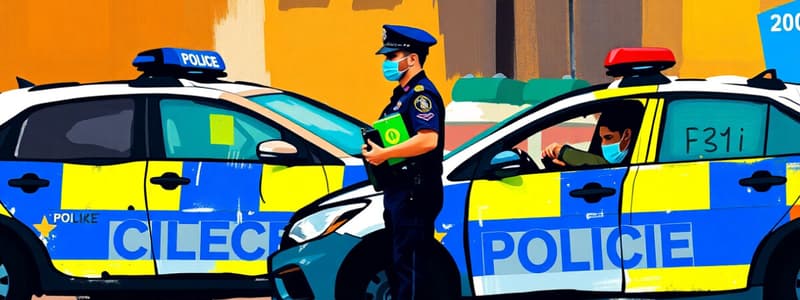Podcast
Questions and Answers
What is the primary responsibility of municipalities under the Police Services Act (PSA)?
What is the primary responsibility of municipalities under the Police Services Act (PSA)?
- To monitor police conduct
- To control police vehicle specifications
- To supervise police training programs
- To provide the necessary infrastructure for police services (correct)
Which section of the Equipment and Use of Force Regulation specifies the type of vehicle not permitted for general police patrol purposes?
Which section of the Equipment and Use of Force Regulation specifies the type of vehicle not permitted for general police patrol purposes?
- Section 20
- Section 25
- Section 10
- Section 15 (correct)
What aspect does the Occupational Health and Safety Act focus on regarding equipment use?
What aspect does the Occupational Health and Safety Act focus on regarding equipment use?
- Responsibilities of employers, supervisors, and workers (correct)
- Responsibility of municipal funding
- Training policy for using vehicles
- Vehicle color specifications
What action is NOT listed as a responsibility of the Chief of Police concerning marked general patrol vehicles?
What action is NOT listed as a responsibility of the Chief of Police concerning marked general patrol vehicles?
Which type of vehicles are explicitly excluded from the focused guidelines on marked general patrol vehicles?
Which type of vehicles are explicitly excluded from the focused guidelines on marked general patrol vehicles?
Flashcards
Police Vehicle Responsibility
Police Vehicle Responsibility
Municipalities must provide suitable police vehicles for effective patrol, per the Police Services Act.
Prohibited Patrol Vehicles
Prohibited Patrol Vehicles
Certain types of vehicles cannot be used for general police patrol, as outlined in regulations.
Marked Patrol Vehicle Policy
Marked Patrol Vehicle Policy
Policies dictate how marked patrol vehicles are governed and maintained by police chiefs.
Vehicle Maintenance Responsibilities
Vehicle Maintenance Responsibilities
Signup and view all the flashcards
Employee Consultation on Vehicles
Employee Consultation on Vehicles
Signup and view all the flashcards
Study Notes
Policing Standards Manual (2000) - Marked General Patrol Vehicles
- Legislative/Regulatory Requirements:
- Municipalities are responsible for vehicle infrastructure supporting police services, per the Police Services Act (PSA).
- Section 15 of the Equipment and Use of Force Regulation specifies prohibited vehicle types for general patrol.
- Occupational Health and Safety Act outlines employer/employee responsibilities related to workplace equipment.
- This guideline only applies to marked general patrol vehicles; specialized vehicles (e.g., surveillance, canines) are excluded. Police services retain full flexibility for those.
Sample Board Policy
- Policy: The Chief of Police will:
- Establish procedures defining marked patrol vehicle functions.
- Guarantee marked vehicles meet specifications.
- Ensure regular maintenance, inspection, and replacement of marked vehicles.
- Consult employee representatives regarding vehicle acquisition.
Police Service Guidelines - Procedures
- Function of Marked General Patrol Vehicles:
- General patrol and service calls.
- Emergency response.
- Personnel/equipment transport.
- Suspect apprehension pursuit.
Equipment Specifications
-
Vehicle Designation:
- Must be manufacturer-designated "police packages".
- Compact/sub-compact vehicles are not permitted for patrol use.
- Solid white colour with visible "police" marking.
-
Reflective Striping:
- Municipal police use blue/red combinations.
- Provincial police use blue/gold combinations.
-
Standard Equipment (General):
- Compatible engine and heavy-duty options where applicable.
- Automatic transmission, power steering, police suspension.
- Power hydraulic ABS braking.
- Highest output alternator, amp-hr/CCA battery.
- Cooling system, engine/transmission coolers.
- Frame, body mounts/unibody, police-rated tires.
- Adjustable tilt wheel, air conditioning, dual airbags.
- Dash-mounted driver/passenger controls.
- Electric remote outside mirrors, trim panels.
- Certified speedometer, police radio/electronics.
- High-quality, 6-way adjustable driver/passenger seats (where applicable).
-
Emergency Equipment and Lighting:
- Meets Highway Traffic Act emergency lighting standards (visible 360 degrees).
- 100-watt minimum forward-facing siren, not interfering with radiator cooling.
- Public address system.
- Safety equipment to fulfill general patrol functions.
Maintenance and Records
-
Maintenance Schedule:
- Police services must adhere to or exceed manufacturer's maintenance schedules for vehicle servicing.
-
Records:
- Accurate maintenance and accident records should be maintained. This includes regular tests and inspections by qualified technicians.
- Replaced parts must meet original equipment manufacturer (OEM) specifications.
-
Employee Consultation:
- Consultation with designated employee representatives prior to acquiring patrol vehicles.
Studying That Suits You
Use AI to generate personalized quizzes and flashcards to suit your learning preferences.




